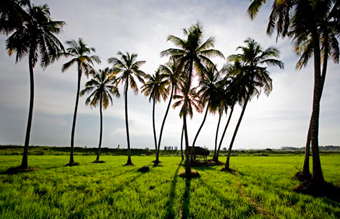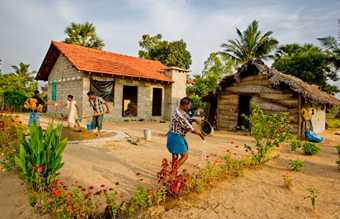 The World Bank report said that in terms of devolution of power to provincial councils, the Sri Lankan government has announced further devolution will only be considered after the forthcoming elections.
The World Bank report said that in terms of devolution of power to provincial councils, the Sri Lankan government has announced further devolution will only be considered after the forthcoming elections. Ilankai Tamil Sangam
Association of Tamils of Sri Lanka in the USA
Published by Sangam.org
by Lanka Business Online, October 24, 2009
|
"The end of armed conflict provides Sri Lanka with a historic opportunity to achieve a dual transition from a low income country in conflict to a middle income country in peace," the bank's latest economic update on the country said. "For longer-term stability needed to bolster the investment climate it would be necessary to address minorities’ underlying grievances." |
World Bank report here.
Oct 24, 2009 (LBO) - Post-war Sri Lanka's ability to attract foreign investments would depend on how the island resolves minority Tamil grievances, eliminates residual security threats and improves its finances, a World Bank report said. "The end of armed conflict provides Sri Lanka with a historic opportunity to achieve a dual transition from a low income country in conflict to a middle income country in peace," the bank's latest economic update on the country said.
"For longer-term stability needed to bolster the investment climate it would be necessary to address minorities’ underlying grievances."
Government forces defeated Tamil Tiger separatists in May, ending the 30-year ethnic war, and creating anticipation of an economic revival.
But underlying Tamil grievances on sharing political power that triggered the war remain unresolved leading to fears Tamil Tiger extremists might try to revive the conflict.
 The World Bank report said that in terms of devolution of power to provincial councils, the Sri Lankan government has announced further devolution will only be considered after the forthcoming elections.
The World Bank report said that in terms of devolution of power to provincial councils, the Sri Lankan government has announced further devolution will only be considered after the forthcoming elections.
Parliamentary and presidential polls are anticipated next year.
The World Bank said that preliminary estimates suggest that Sri Lanka’s long-term potential growth rate is around six percent.
"The post-conflict boom may help Sri Lanka to return relatively rapidly to growth rates in this range, but is unlikely to significantly increase the long-term potential growth rate, unless a significant structural policy agenda is implemented."The bank said that prospects for enhanced foreign direct investment inflow would depend on an improvement in the overall investment climate, elimination of the security threat, improvement in debt sustainability prospects and continuation of low inflation.
"In the short-to-medium term, prospects for the Sri Lankan economy look positive," the report said.
"First, there are increasing signs that the global economic crisis is bottoming out.
"Prospects of a global recovery would provide enhanced growth impetus through recovery in exports, increase in tourism and possible greater FDI inflow."
In a low-inflation environment, the real effective exchange rate can be expected to support export competitiveness, the World Bank said.
 "The tourism sector is already showing signs of reaping the end-of-conflict dividend, with July and August arrivals having risen substantially."
"The tourism sector is already showing signs of reaping the end-of-conflict dividend, with July and August arrivals having risen substantially."
But the bank said that sustaining the positive investor sentiment will be a key challenge in the coming months.
"A still-weak global economy, uncertainty about the continuation of the preferential access for Sri Lankan exports to the EU market under the GSP+ scheme and persistently high fiscal deficits are risks to the outlook."
On the other hand, the World Bank said, reconstruction spending in the war-affected north is expected to provide a short-term stimulus, while the lagged effects of the recent monetary stimulus would also act as a fillip.
"In the longer term, movement towards a sustainable political solution to the underlying causes of the conflict will be key, as will decisive moves on the structural policy agenda to unleash Sri Lanka’s full growth potential."
© 1996-2025 Ilankai Tamil Sangam, USA, Inc.